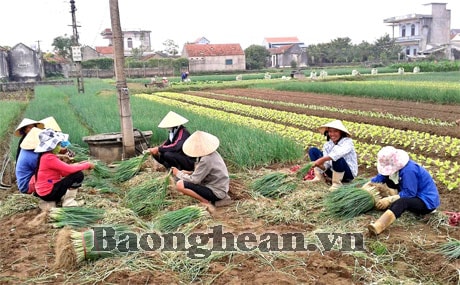Lesson 2: Strengthening chemical residue monitoring
Contacting vegetable growers in the above localities, we found that most of them have received very little propaganda and training on the use of pesticides. Therefore, the source of pesticides and stimulants for vegetables are all bought by people floating on the market without knowing the origin of these pesticides.
Of the 10 types of pesticides that we have tested on vegetable fields in Dien Thanh and Quynh Luong, Mr. Nguyen Xuan Binh - Head of the Inspection Department of the Provincial Plant Protection Department said: There are 7 types of pesticides that are not on the list of pesticides prescribed by the Ministry of Agriculture such as SHA CHONG SUANG 90 W, ARRIO USA (USA), DUO XIAO MEISU, MI DAN 10 WP, DIAZOL, TA SIEU, REASGANT. Most of these pesticide shells have a yellow background and are toxic in group II. These pesticides have extremely high concentrations and are toxic. If used improperly, they will seriously affect the health of consumers.
In addition, there are 9 types of foliar fertilizers (foliar fertilizers) that we collected from vegetable fields in the above 2 localities. After checking the list of fertilizers allowed to be produced, traded and used in Vietnam as regulated by the Ministry of Agriculture, there are 5 types that are not on the list: Dau Trau 702, AMINO GREEN, NI MAG, SHAKTI, GRUDELLA. It is known that the type of foliar fertilizer used to stimulate vegetables, tubers and fruits contains the very toxic substance thiourea, classified by the US Environmental Protection Agency (US EPA) as a group B2 toxic substance. After conducting many experiments on animals, this agency also determined that thiourea is harmful to the blood system, reducing white blood cells and platelets. However, for many years, foliar fertilizers containing thiourea have still been sold on the market.
According to the latest statistics of the Ministry of Health, each year Vietnam has about 200,000 more people with cancer. According to agricultural experts, many foliar fertilizer products currently contain toxins but the toxins are hidden; they are only listed as macro-micronutrients, organic ingredients... For example, nitrobenzene is found in some types of foliar fertilizers, commonly used by farmers in Dong Thap for watermelon, vegetables, tomatoes... But few people know that related industries have discovered through testing that nitrobenzene is a toxin that causes cancer, reduces fertility, and when in contact with the skin causes burns, liver poisoning, and nerve poisoning. The decomposition time of this substance is 125 days. It can be said that many vegetable fields use many sprays of foliar fertilizers to help vegetables grow quickly. Before the toxic chemicals have time to decompose, people have already pulled up and sold the vegetables. The toxins from pesticides combined with the toxins from foliar fertilizers of unknown origin will cause great harm to consumers.
However, when talking to us about the widespread spraying of pesticides and growth stimulants on vegetables, the leaders of the commune and the district's Department of Agriculture mostly "praised" themselves.

Quynh Luong people are harvesting onions.
Ms. Le Thi Huong - Vice Chairman of Dien Thanh Commune People's Committee (Dien Chau) explained: Dien Thanh has over 57 hectares of vegetables, the commune is building vegetables according to VietGap standards. The source of plant protection drugs is mainly provided by the commune's agricultural service cooperative to the people. The commune also established a team to inspect the spraying of plant protection drugs. So why do people still use pesticides and stimulants that are not on the list of permitted use of the Ministry of Agriculture? I asked. Ms. Huong said: We also propagate and train, but still cannot check everything, so some cases occur.
Mr. Nguyen Tien Duc - Head of the Provincial Plant Protection Department added: The province has 8 key vegetable growing districts, about 27,000 hectares. The current mentality of vegetable growers is to use highly toxic pesticides, spraying them on insects to kill them immediately, and using pesticides based on experience. The management of business and use of pesticides is still being neglected, mainly by the Plant Protection Department.
Faced with the above situation, according to Mr. Duc, the program to monitor chemical residues on agricultural products needs to actively coordinate with local authorities, promote propaganda for vegetable growers, and manage the use of chemicals. For farming households in safe vegetable production areas, create a monitoring record, record the process of fertilizing time, spraying time for management right at the production facility. For the group of subjects being facilities, cooperatives, and safe vegetable production groups, if residues are found to exceed the permitted level, the Plant Protection Department will invite organizations and individuals to notify for remedial measures. If the above organizations do not cooperate and do not adjust the production process, the Plant Protection Department will apply sanctions according to regulations, and may propose to revoke the certificate of safe vegetable production. For organizations and individuals trading in fruits and vegetables, a list of farmers and areas producing agricultural products in the direction of food safety and hygiene is provided. Consumers will be updated with information about production areas and vegetables at high risk of pesticide residues. Relevant agencies will organize sampling and analysis of pesticide residues.
The widespread use of pesticides and foliar fertilizers and growth stimulants is at an alarming level. In addition to educating vegetable growers, relevant agencies need to disseminate documents on the list of pesticides and foliar fertilizers that are permitted for trading and use in Vietnam as regulated by the Ministry of Agriculture. Relevant agencies, especially localities, need to regularly inspect and monitor farmers' spraying of pesticides in the fields to take timely measures to prevent the widespread spraying of pesticides that is harmful to human health.
Dinh River






